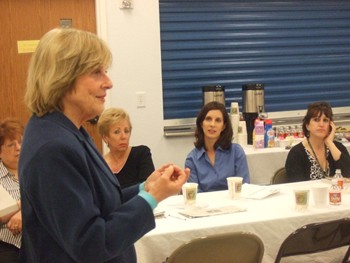
Author Eva Etzioni-Halevy speaks about her new book in Flower Mound. (Natalia Jones)
When Eva Etzioni-Halevy was a child, she studied the Bible daily in her religious boarding school in Israel. However, it would not be until years later after a couple of moves to foreign countries until she truly appreciated the significance and meaning of the holy text.
While Etzioni-Halevy and her husband were living in Australia, they both sensed it was important for them to return to Israel.
“We felt very isolated in a spiritual sense and we felt that something was missing from our lives,” Etzioni-Halevy said. “This is what really brought us back to Israel and to explore our roots.”
As Etzioni-Halevy began to read the Bible again she said she became particularly entranced by the women of the Bible.
This fascination transformed Etzioni-Halevy from not just a Professor of Sociology at Bar-Ilan University, but also into a fictional biblical novelist. And now with the release of her second book, “The Garden of Ruth,” it has brought her all the way to Flower Mound where on Tuesday she signed copies of her novel at the Congregation Kol Ami.
Although her experience as a sociology professor helped her in the process of researching her novels, Etzioni-Halevy said that moving from political sociology to writing fiction was like moving into a new land, which felt like a cultural shock.
“In academic books things are written in a completely different manner and (with fiction) it’s much more letting your imagination work,” Etzioni-Halevy said. “The difference is that in academic research you are supposed to show how clever you are, but in fiction you’re supposed to conceal it. You don’t want your readers to be aware of it. Some people may miss all of the research that went into it, but that’s okay so long as they enjoyed reading it.”
Etzioni-Halevy said that the reason she chose the story of Ruth for her second novel was because she was attracted to the mystery within the story.
Ruth, a Moabite woman, traveled to Bethlehem with mother-in-law Naomi after her husband died. Since widows during the time could not inherit their husband’s properties, salvation for the two widows had to come from the next of kin who by law was bound to marry Ruth. However, the next of kin in the Bible is only referred to as the unnamed whom refused to wed Ruth. While the next of kin to the unnamed man did marry Ruth, it is this unknown man’s refusal to marry Ruth that sparked Etzioni-Halevy’s interest for writing the novel.
“How fascinating it is that the Bible, which was written thousands of years ago, could have a mystery in it,” Etzioni-Halevy said.
Etzioni-Halevy said that she also had other motives for writing the novel. Her main purpose was to show the feminine perspective and to give the women in the Bible a voice.
“I think that even today’s women would like to hear that voice and identify with the women of the Bible because they were very strong women,” Etzioni-Halevy said.
Also, Etzioni-Halevy said that she wanted to include a message of the importance of interfaith tolerance among religions, especially that among Jews and Christians.
“I think biblical novels based on the Old Testament particularly are very important because they show our common cultural origins,” Etzioni-Halevy said. “In a way the novels are a celebration of monotheism which Judaism and Christianity share in that it’s the basis of our common culture and the basis of Western culture.”
Most of the novel consists of actual places and people described in the Bible, but Etzioni-Halevy said that she did add a couple of fictional characters and events to the story. The most important is that of the biblical detective Osnath whose own life becomes interlaced with the story of Ruth and King David.
“By bringing her in I turned this into a family saga that spans over three generations and also into a mystery novel,” Etzioni-Halevy said. “This combination, I think, worked, and you get two celebrities.”
Though Etzioni-Halevy is still completing her book tour for her second novel, she has already signed a contract for her third novel.
The novel will be about Deborah, who Etzioni-Halevy said is the most preeminent woman mentioned in the Bible, and should be available sometime next March.








